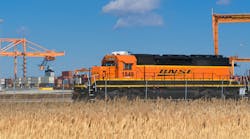The House voted Nov. 30 for legislation to block a rail strike that could hamper freight capacity nationwide, hamstringing not only the economically vital holiday season, but the trucking industry, which would have to carry some of rail's lost volume.
The bill passed the House 290-137, moving on to the Senate. If passed there, President Biden, who on Nov. 28 asked Congress to halt the potential strike, is expected to sign it into law.
A strike could occur as soon as Dec. 9, as four of the 12 freight rail unions voted against a tentative agreement brokered by the Biden administration. If the bill is signed into law, it would impose the terms of September’s tentative agreement upon rail workers. That agreement would raise wages, but many union members who voted on it did not believe it offered enough paid sick leave, according to a statement from rail union Brotherhood of Maintenance of Way Employes Division.
See also: Congress expected to step in to block rail strike
As a response from Democratic lawmakers that characterize the bill as anti-labor, House Speaker Nancy Pelosi responded by adding a second vote Nov. 30 that would add seven days of paid sick leave per year for rail workers covered under the agreement. The House passed that bill 221-207.
The bill guaranteeing extra sick days would take effect only if the Senate passes both measures, according to The Associated Press. The Senate is expected to vote on both bills next week, before the Dec. 9 strike date.
When asked whether Senate Republicans would support blocking the rail strike, Senate Minority Leader Mitch McConnell told the media on Nov. 29, “I think some may be inclined to vote against it, and others are arguing that the economic price of doing that is too great.”




